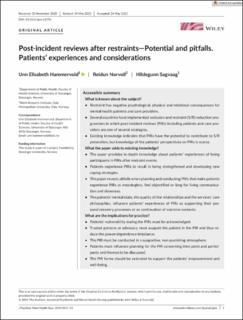Post-incident Reviews after Restraints, – Potential and Pitfalls. Patients' experiences and considerations
Peer reviewed, Journal article
Published version
Permanent lenke
https://hdl.handle.net/11250/2762356Utgivelsesdato
2021-06-01Metadata
Vis full innførselSamlinger
Originalversjon
Journal of Psychiatric and Mental Health Nursing. 2021, (1-12). https://doi.org/10.1111/jpm.12776Sammendrag
Introduction: Post-incident reviews (PIRs), including patients, nurses and other care providers, following incidents of restraints are recommended in mental health ser- vices. Few studies have examined patients’ experiences and considerations concern- ing PIRs.
Aim: The study aims to explore patients’ perspectives on PIRs in relation to how they experience participation in PIRs and further view PIRs’ potential for care improve- ment and restraint prevention.
Method: We conducted a qualitative study based on individual interviews. Eight current and previous inpatients from two Norwegian mental health services were interviewed.
Results: The patients experienced PIRs as variations on a continuum from being strengthened, developing new coping strategies and processing the restraint event to at the other end of the continuum; PIRs as meaningless, feeling objectified and long- ing for living communication and closeness.
Discussion: PIRs’ beneficial potential is extended in the study. The findings highlight however that personal and institutional conditions influence whether patients expe- rience PIRs as an arena for recovery promotion or PIRs as continuation of coercive contexts.
Implications for practice: We recommend patients’ active participation in planning the PIR. PIRs should be conducted in a supportive atmosphere, including trusted per- sons, emphasizing and acknowledging a dialogical approach.

